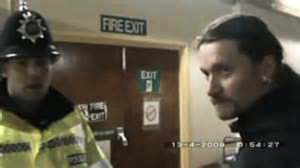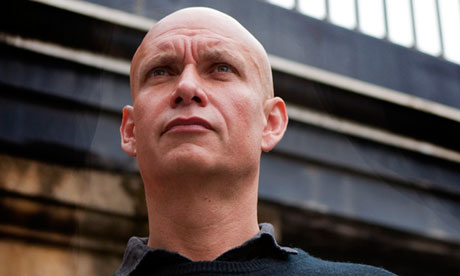Law Unto Themselves: Spycops & Miscarriages of Justice

Undercover officer Mark Kennedy, under arrest in 2009
Officers from Britain’s political secret police lived for years among the people they spied on. They had to truly become activists, not just participating but instigating.
They made a personality trait out of berating people for not being hardcore enough, persuading comrades to take more serious action which was often organised by the officers themselves. They planned illegal activity, marshalled people to it, and were even prosecuted under their false identities.
None of this was meant to happen. In 1969, a year after the Special Demonstration Squad (SDS) was formed, the Home Office issued explicit instructions;
‘No member of a public authority or source (informant) should counsel, incite or procure the commission of a crime’.
They were just as unequivocal about the possibility of coming to court.
‘The police must never commit themselves to a course which, whether to protect an informant or otherwise, will constrain them to mislead a court in subsequent proceedings. This must always be regarded as a prime consideration when deciding whether, and in what manner, an informant may be used and how far, if at all, he is allowed to take part in an offence.’
Mark Kennedy was one of the small, tight-knit group that organised an attempt to shut down Ratcliffe on Soar coal-fired power station in April 2009. The night before the action, police raided the preparatory meeting and 114 people, including Kennedy, were arrested. Twenty were convicted before a further six were prosecuted in a separate trial.
In legal cases, the prosecution have a duty to disclose anything that may be helpful to the defence. By the time the Ratcliffe 6 came to court, Mark Kennedy had been exposed as a police officer, so they asked to see his evidence. Rather than hand it over, the state dropped the charges. The other twenty then had their convictions quashed.
A year earlier, Kennedy had been a driver for 29 people who had stopped a train of coal on its way to Drax power station in Yorkshire. They were convicted but have now also had their convictions wiped. This brings Kennedy’s personal total to 49.
If the other 150 or so officers have similar tallies, it means about 7,000 wrongful convictions are being left to stand. Even if we conservatively estimate just one false conviction per officer per year of service, it adds up to about 600. It may well be that spycops are responsible for the biggest nobbling of the judicial system in English history.
Some spycops went all the way to court themselves. They would swear to tell the truth, the whole truth and nothing but the truth and, from the first question asking their name, they lied and lied and lied. This fits anyone’s definition of perjury and perverting the course of justice.
OFFICERS PROSECUTED
Jim Boyling infiltrated Reclaim the Streets and was one of a group of people arrested on a protest at a Transport for London office in 1996. He was then in meetings with other defendants and party to the defence lawyer’s advice, a direct breach of lawyer-client privilege. Most of the group were acquitted but one, John Jordan, was convicted. After Boyling’s exposure in 2011, Jordan embarked on a three year battle to successfully clear his name. Despite the victory, the judge refused to release any papers that explained why the conviction was overturned.
Following the 1997 court case, Boyling and Jordan went on to be part of the small, secret ‘logistics group’ who organised the tactics for the June 18th 1999 Carnival Against Capitalism in the City of London which ended in substantial property damage. The police’s slow response on the day is baffling, given it is now clear that they knew – indeed, helped draw up – the plans.
Bob Lambert, an SDS officer who later went on to run the unit, admitted he was arrested ‘four or five’ times whilst undercover and that he appeared in court in 1986 for a ‘minor public order offence’, understood to be leafleting outside a shop. He bizarrely claims not to remember if he was actually convicted.
Among the raft of reports into spycops, one of the few that has any credibility is Mark Ellison’s review of spying on the family of Stephen Lawrence. In researching it, he came upon such compelling evidence of miscarriages of justice that he did a second investigation. He faced many hurdles – the report begins with a description of the police not supplying him with the necessary staff or even any office space.
Beyond that, Ellison faced problems with the files. The Metropolitan Police recently described their record keeping as ‘chaotic and dysfunctional’, and this is before we consider the fact that secret units by their nature did not leave paper trails, and the police do not like to admit their corruption. As Lambert told Ellison:
‘we were part of a ‘black operation’ that absolutely no one knew about and only the police had actually agreed that this was all OK’.
Even with the spycops’ pathological reluctance to write anything down and their enthusiasm for shredding, Ellison found records of 26 SDS officers being arrested on 53 occasions. He has ensured 83 people’s convictions will be reviewed.
WHO PROSECUTES THE PROSECUTORS?
The problem is that they’re going to be looked at by the Crown Prosecution Service, the agency who helped secure many of the wrongful convictions. Piecing together facts from two different reports into the Mark Kennedy/Ratcliffe debacle, it’s clear the police and CPS colluded to engineer a miscarriage of justice.
Rather than a crime being committed and the police passing evidence to the CPS, the CPS knew the details of the action before it happened, indeed before many of the activists themselves.
We know the case was overseen by Nick Paul, the CPS’ Domestic Extremism Co-ordinator. It’s alarming that they have someone with that job title, given that ‘domestic extremism’ is a term with no meaning in law, it’s just used for police convenience to smear dissenters with overtones of terrorism. Nick Paul was also the CPS’s chief for the Drax coal train miscarriage of justice. The CPS refused to answer a Freedom of Information request on what other cases he handled.
Bob Lambert has suggested that he might not have committed perjury when prosecuted as the court may have been secretly told he was a police officer and played along. Mark Ellison found this kind of thing had indeed happened. If this was standard practice it is even more worrying as it adds the courts to the list of agencies that have contravened their fundamental purpose to help entrap citizens.
Is this really the biggest corruption of the judicial system in history? We don’t know. We only have details of 17 exposed officers from the political secret police units. We have no idea what the other 90% did. The Kennedy cases are the only ones where we’ve secured significant release of papers and investigations, and they certainly point to blasé, systemic abuse.
The only way to find the truth is to publish details of all officers from the disgraced units. Only then can people come forward with their stories of being duped, cajoled and convicted. At the moment, the police flatly refuse to do so and the achingly slow public inquiry, delayed before it even begins, has not provided any new information. Justice delayed is justice denied.


